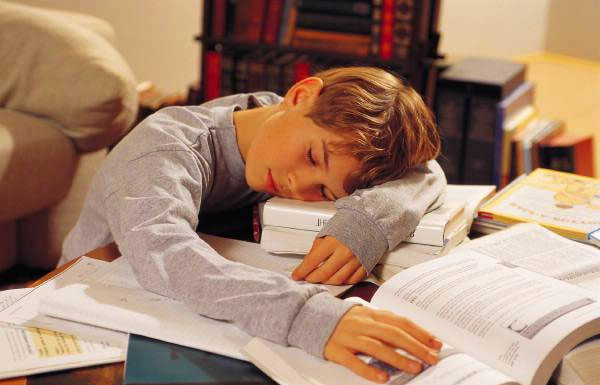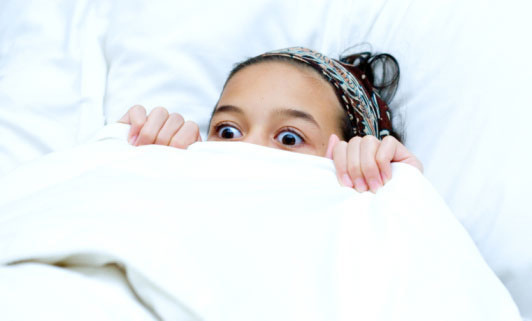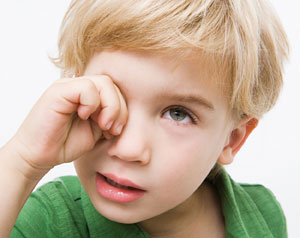Sleepdisorderinchildrenneedstobeaddressedattheearliestasitaffectstheoveralldevelopment.Learnabouttheimpactsofsleepdisorderandfindtipsforhelpingchildrentodealwithit.Generally,achildoranadolescentrequiresatleast9hoursofsleepeverynight.Disturbedsleeporlackofsleepcanrenderalotofnegativeimpactonthephysicalandmentalwell-beingofthekid.Itnotonlyaffectshisperformanceinstudies,sportsandotherextracurricularactivities,butinfamilyandsocialrelationshipsaswell.InthisarticleImpactsofSleepDisorderSymptomsofSleepDisorderinChildrenProperBedtimeRoutineRelaxationRoutineBedroomSettingsChildsDailyDietImpactsofSleepDisorderGivenbelowaresomeoftheimpactsofsleepdisorder:Thekiddisplayssymptomsofbehaviouralproblems.Itcanrangefromlackofinterestinactivitieshappeningaroundhim,lackofattentionandinabilitytofollowinstructionsproperly.Therecanbepersistentmoodproblems.Thekidmightgetirritatedandannoyedateverylittlething.Heisconstantlyinafoulmood.Performancewillbedeteriorating.Duetoalackofsleepordisturbedsleep,thekidisunabletopayattentioninclassandalsounabletocompletehislessonsintime.Asaresulthisgradessuffer.Similarly,ifthekidisinvolvedinotherlearningactivitieslike,music,paintingordancesetc,andtheseactivitiestoodoesnotinterestthekidanymore.Hisperformancedropsintheretoo.Hismemoryisaffected.Sincethechildisunabletofocusandpaydueattentiontotheexplanationoflessonsinclass,heisunabletolearnandunderstandhislessons.Mostkidswithsleepdisordersshowslowerreaction.Thismeansthatthekidwillrespondlateorreacttoacertainsituationmuchafterthenitisnormalforanyothernormalkidtoreact.Thereisapossibilitythatthekidispronetoaccidentsandinjuriesjustbecauseofasleepdisorder.Asthechildsbrainisnotrestedenough,heisunabletocomprehendthedangerlyingahead,forexampleapillarisonhiswayuptothestairs,attherightmomentandendsupbanginghisheadonthepillar!SymptomsofSleepDisorderinChildrenHowwouldyouknowthatthechildissufferingfromsleepdisorder?Thesearesomeeasyobservationsthatwillhelpyouunderstandandtakecorrectivemeasures:Ifyoufindyourkidissnoringalot,itmeansthatheishavingadisturbedsleep.Ifyoufindthatthereisacoupleoformorebreathingpausewhilethechildissleeping.Ifthechildhasanintermittentsleeppatternthroughoutthenight;thatis,hewakesupfrequentlyandmayormaynotfallasleepagainreadily.Ifthechildisnotabletostayawakecomfortableduringtheday.Iftheperformanceofthechildinhisdailyactivitiesarenotaccordingtowhatyouwouldnormallyexpect.Ifthechildcomplainsofunusualdreamsorthingsthatheimagineshappeningwithhimwhenhewasasleep.HelpingChildtoCopewithSleepDisorderHereareafewwaystohelpyourchilddealwiththesleepdisorder:ProperBedtimeRoutine-Setuparoutineforthebedtimings.Putthechildtobedwithoutfaileverydayatthesametime,andmakesurethathehasabedofhisown.Similarly,heshouldalsowakeupatthesametimeeveryday.RelaxationRoutine-Setuparelaxationroutinebeforebedtime.Thiscanbelisteningtosomeinstrumentalmusic,orwhateverissoothingandpleasesthekid,orreadinganicestorybook.Givehimawarmbathjustbeforeenteringthebedatnight.BedroomSettings-Thebedroommustnotbetoocoldorwarm;itshouldhaveacomfortabletemperature.Itshouldalsobedarkorverydimlylit,whateverispreferredbythekid.Thenoiselevelinthehousewhenthechildgoestosleepmustbelowered.ChildsDailyDiet-Beforebedtime,thechildshouldnothaveaveryheavymeal.Hisdinnershouldbelightandeasilydigestible.Atleast6sixhourspriortobedtime,thekidshouldnothaveanyfoodordrinkcontainingcaffeine.Somekidshaveanafterdinnerplaytimeactivity.Forkidswithsleepingdisorders,thiscanbeanaddeddistraction.Stopthisroutineandshifttheplaytimetowardstheeveningorbeforedinner.Thereshouldnotbeanytelevisionwatchingorsurfingthecomputerorplayingvideogamesforolderchildren,beforebedtime.Finally,forinfantsandchildren,makeitapointtoputthemintheirowncribsorbedwhentheyaretiredandnotyetasleep.Alsodonotmakeitaroutinetosleepwiththekid,whenheisgoingtosleeporgointobedwithhim.Puthimtosleepaloneinhisbed.
Sleep disorder in children needs to be addressed at the earliest as it affects the overall development. Learn about the impacts of sleep disorder and find tips for helping children to deal with it.Generally, a child or an adolescent requires at least 9 hours of sleep every night. Disturbed sleep or lack of sleep can render a lot of negative impact on the physical and mental well-being of the kid. It not only affects his performance in studies, sports and other extracurricular activities, but in family and social relationships as well.
Impacts of Sleep Disorder
Given below are some of the impacts of
sleep disorder:
The kid displays symptoms of behavioural problems. It can range from lack of interest in activities happening around him, lack of attention and inability to follow instructions properly.
There can be persistent mood problems. The kid might get irritated and annoyed at every little thing. He is constantly in a foul mood.
Performance will be deteriorating. Due to a lack of sleep or disturbed sleep, the kid is unable to pay attention in class and also unable to complete his lessons in time. As a result his grades suffer. Similarly, if the kid is involved in other learning activities like, music, painting or dances etc, and these activities too does not interest the kid anymore. His
performance drops in there too.
His
memory is affected. Since the child is unable to focus and pay due attention to the explanation of lessons in class, he is unable to learn and understand his lessons.
Most kids with sleep disorders show slower reaction. This means that the kid will respond late or react to a certain situation much after then it is normal for any other normal kid to react.
There is a possibility that the kid is prone to accidents and injuries just because of a sleep disorder. As the child's brain is not rested enough, he is unable to comprehend the danger lying ahead, for example a pillar is on his way up to the stairs, at the right moment and ends up banging his head on the pillar!
Symptoms of Sleep Disorder in Children
How would you know that the child is suffering from sleep disorder? These are some easy observations that will help you understand and take corrective measures:
- If you find your kid is snoring a lot, it means that he is having a disturbed sleep.
- If you find that there is a couple of or more breathing pause while the child is sleeping.
- If the child has an intermittent sleep pattern throughout the night; that is, he wakes up frequently and may or may not fall asleep again readily.
- If the child is not able to stay awake comfortable during the day.
- If the performance of the child in his daily activities are not according to what you would normally expect.
- If the child complains of unusual dreams or things that he imagines happening with him when he was asleep.
Helping Child to Cope with Sleep Disorder
Here are a few ways to help your child deal with the sleep disorder:
Proper Bedtime Routine -
Set up a routine for the bed timings. Put the child to bed without fail every day at the same time, and make sure that he has a bed of his own. Similarly, he should also wake up at the same time every day.
Relaxation Routine -
Set up a
relaxation routine before bed time. This can be listening to some instrumental music, or whatever is soothing and pleases the kid, or reading a nice storybook. Give him a warm bath just before entering the bed at night.
Bedroom Settings -
The bedroom must not be too cold or warm; it should have a comfortable temperature. It should also be dark or very dimly lit, whatever is preferred by the kid.The noise level in the house when the child goes to sleep must be lowered.
Child's Daily Diet -
Before
bedtime, the child should not have a very heavy meal. His dinner should be light and easily digestible. At least 6 six hours prior to bedtime, the kid should not have any food or drink containing caffeine. Some kids have an after dinner playtime activity. For kids with sleeping disorders, this can be an added distraction. Stop this routine and shift the playtime towards the evening or before dinner.
There should not be any television watching or surfing the computer or playing video games for older children, before bedtime.
Finally, for infants and children, make it a point to put them in their own cribs or bed when they are tired and not yet asleep. Also do not make it a routine to sleep with the kid, when he is going to sleep or go into bed with him. Put him to sleep alone in his bed.































